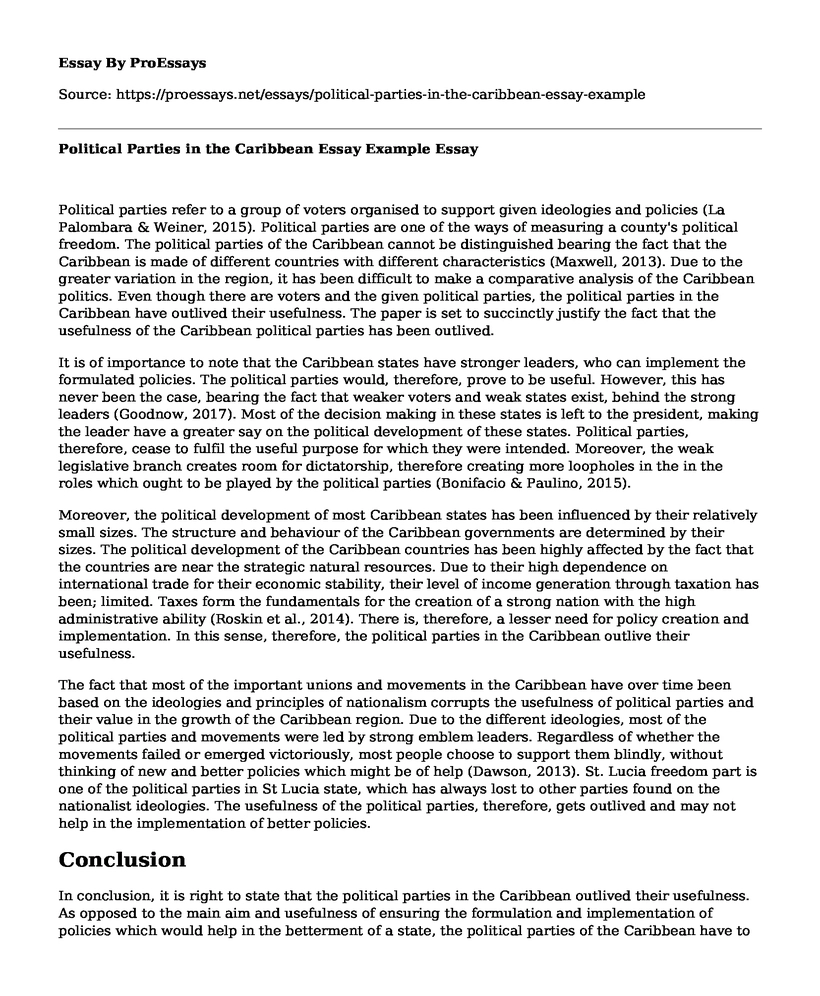Political parties refer to a group of voters organised to support given ideologies and policies (La Palombara & Weiner, 2015). Political parties are one of the ways of measuring a county's political freedom. The political parties of the Caribbean cannot be distinguished bearing the fact that the Caribbean is made of different countries with different characteristics (Maxwell, 2013). Due to the greater variation in the region, it has been difficult to make a comparative analysis of the Caribbean politics. Even though there are voters and the given political parties, the political parties in the Caribbean have outlived their usefulness. The paper is set to succinctly justify the fact that the usefulness of the Caribbean political parties has been outlived.
It is of importance to note that the Caribbean states have stronger leaders, who can implement the formulated policies. The political parties would, therefore, prove to be useful. However, this has never been the case, bearing the fact that weaker voters and weak states exist, behind the strong leaders (Goodnow, 2017). Most of the decision making in these states is left to the president, making the leader have a greater say on the political development of these states. Political parties, therefore, cease to fulfil the useful purpose for which they were intended. Moreover, the weak legislative branch creates room for dictatorship, therefore creating more loopholes in the in the roles which ought to be played by the political parties (Bonifacio & Paulino, 2015).
Moreover, the political development of most Caribbean states has been influenced by their relatively small sizes. The structure and behaviour of the Caribbean governments are determined by their sizes. The political development of the Caribbean countries has been highly affected by the fact that the countries are near the strategic natural resources. Due to their high dependence on international trade for their economic stability, their level of income generation through taxation has been; limited. Taxes form the fundamentals for the creation of a strong nation with the high administrative ability (Roskin et al., 2014). There is, therefore, a lesser need for policy creation and implementation. In this sense, therefore, the political parties in the Caribbean outlive their usefulness.
The fact that most of the important unions and movements in the Caribbean have over time been based on the ideologies and principles of nationalism corrupts the usefulness of political parties and their value in the growth of the Caribbean region. Due to the different ideologies, most of the political parties and movements were led by strong emblem leaders. Regardless of whether the movements failed or emerged victoriously, most people choose to support them blindly, without thinking of new and better policies which might be of help (Dawson, 2013). St. Lucia freedom part is one of the political parties in St Lucia state, which has always lost to other parties found on the nationalist ideologies. The usefulness of the political parties, therefore, gets outlived and may not help in the implementation of better policies.
Conclusion
In conclusion, it is right to state that the political parties in the Caribbean outlived their usefulness. As opposed to the main aim and usefulness of ensuring the formulation and implementation of policies which would help in the betterment of a state, the political parties of the Caribbean have to a greater extent corrupted and wasted the political development of the Caribbean as a region. The relative proximity to the strategic natural resources as well as the relatively small sizes of the states has been one of the contributing factors to alteration. Weak states and strong leaders is another factor that has greatly derailed the political parties and their roles.
References
Bonifacio, R., & Paulino, R. (2015). Corruption and Political Participation in the Americas and the Caribbean. Brazilian Political Science Review, 9(2), 54-80.
Dawson, A. (2013). The social determinants of the rule of law: a comparison of Jamaica and Barbados. World Development, 45, 314-324.
Goodnow, F. J. (2017). Politics and administration: A study in government. Routledge.
La Palombara, J., & Weiner, M. (2015). Political Parties and Political Development.(SPD-6). Princeton University Press.
Maxwell, R. (2013). The integration trade-offs of political representation. european political science, 12, 467-478.
Roskin, M. G., Cord, R. L., Medeiros, J. A., & Jones, W. S. (2014). Political science: An introduction. Pearson.
Cite this page
Political Parties in the Caribbean Essay Example. (2022, Sep 18). Retrieved from https://proessays.net/essays/political-parties-in-the-caribbean-essay-example
If you are the original author of this essay and no longer wish to have it published on the ProEssays website, please click below to request its removal:
- Compare and Contrast Mao Zedong and Kim Jung-Un's Use of Propaganda
- The Interaction Between the State and the Local Government - Paper Example
- The Impact of Brexit Deal on Eurostar Paper Example
- Essay Sample on Electoral College vs. Popular Vote
- Democratization in Egypt and Tunisia - Essay Sample
- Paper Example on Law Policy Revolution: Impact on Services Around the World
- Free Essay Sample on Global Business Strategies: Achieving Global Competitiveness







